by Katherine Kama‘ema‘e Smith
Cover & feature photography by Brian Suda
It is said, “love conquers all.” And the riveting story of Roy Sakuma’s life and his outreach to at-risk youth proves that the lasting power of love can heal hearts and change minds.
We all recognize Roy as the ‘ukulele master artist and teacher who founded the annual ‘Ukulele Festival Hawaii that recently celebrated 47 years at Kapiolani Park. Roy also hosts the popular concert series every summer surrounded by the animals at the Honolulu Zoo stage. He and his wife, Kathy, run four music studios where kids and adults learn the joy of playing ‘ukulele. Today, you will learn how Roy came to be Hawai‘i’s foremost ‘ukulele teacher and proponent of the instrument, and the powerful role love has played in his success.
I Want to Play That Song
In the 1960s, before Jake Shimabukuro or Israel Kamakawiwo‘ole, the ‘ukulele was regarded by most people as a novelty, according to Roy. Aside from virtuosos Herb “Ohta-San” Ohta and Eddie Kamae, the little Portuguese instrument was popular at the beach and backyard parties but seldom featured by Hawai‘i’s serious musicians, who preferred guitar, steel guitar, piano and even vibes. Mainland rock and roll was king, with electric guitar, bass, saxophone and lots of drums.
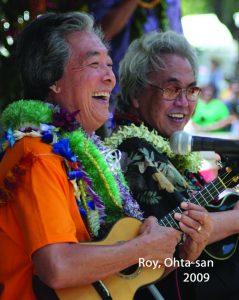
Roy Sakuma and Ohta-San performing together at the 39th Annual ‘Ukulele Festival in 2009.
Photography by Wendal Au.
“One weekend, I was riding in an older kid’s car and heard Ohta-San playing Sushi on the radio,” said Roy. “I fell in love with the song. A couple of days later, I saw a classified ad for ‘ukulele lessons with Ohta-San and went right over.
“Playing the ‘ukulele grabbed me,” Roy said. “After 18 months, Ohta-San encouraged me to go on my own. He said that he had taught me what it took him five years to learn and the rest was up to me. ‘Go out and develop your own style,’ he said. So, I kept playing and the better I got, the more I realized how great my teacher was.”
“Ohta-San encouraged me to go on my own. ‘Go out and develop your own style,’” he said.
Roy soon began helping out at Ohta-San’s studio every weekend. When Ohta-San booked a two-week concert tour in Japan, he asked Roy to teach in his absence.
“I cannot teach,” answered Roy.
“Just do what I do,” said Ohta-San.
Roy was just 18 and he practiced all week to stand up in front of 25 adult students.
“I was very nervous until I began; then, the words just spilled out,” said Roy. “After Ohta-San returned, he asked me, ‘How did you like teaching my students?’ When I said I loved it, he told me to keep teaching them. Ohta-San continued his stellar performing career here and in Japan. And me — wow — after that, all I wanted to do was teach!”
Roy opened Roy Sakuma Ukulele Studios in 1974 and ran his own classified ad. Over 40 students signed up; four were youngsters — Jason Mitsunaga, Dean Guzman, Milton Chun and Michael Ganab.
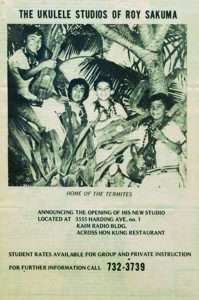 “I wanted these kids to have fun so we started a group called ‘The Termites,’” Roy said. “They were terrific young musicians, and their success and Orange Exchange TV commercial inspired children to learn the ‘ukulele. That grew into four studios and now we are teaching the kids or grandkids of our early students. At our studios, we not only teach music but we also teach love and respect. We care about our staff, and mentor them to treat the students with the same love and respect they receive from us. My philosophy is to put love on top of everything.”
“I wanted these kids to have fun so we started a group called ‘The Termites,’” Roy said. “They were terrific young musicians, and their success and Orange Exchange TV commercial inspired children to learn the ‘ukulele. That grew into four studios and now we are teaching the kids or grandkids of our early students. At our studios, we not only teach music but we also teach love and respect. We care about our staff, and mentor them to treat the students with the same love and respect they receive from us. My philosophy is to put love on top of everything.”
Sad Hanabata Days
This joyful man with a deep abiding faith in the power of love, who mentored generations of ‘ukulele players, said he never understood love until he was in his 20s. When Roy was a child, his family struggled with mental illness and isolation. His mother suffered from schizophrenia. His father cared for her at home. A burdened but faithful provider, he overcome his sadness every evening at a local bar. Roy’s older brother also developed schizophrenia and once attacked Roy with a kitchen knife. “I remember sitting at the table watching my mother and brother talking to themselves. My daydreams gave me hope. There was little to eat, except sandwiches my father brought home from the tavern. The one bright light was my older sister, Faye, who was always there to watch over and protect me.”
Roy was born in 1947. One of his ears was half normal size. Adults would snicker at him and school children would ask, “What’s wrong with your ear?” When he asked his mom, she told him “Blame Buddha for making you like this. Look at all the people; they don’t like us.”
He became paranoid about his ear and avoided school. “When you are not in school, you find trouble. At age 6, I began smoking. At nine, I was drinking beer. Bad habits lead to mischief.”
Like most children, Roy was very honest. He told his dad that he was drinking. His father disapproved and punished him, but Roy continued smoking and drinking.
By age 10, Roy said he was holding “little balls of hurt” inside him. He learned how to tease other kids — to crush them with words and insults before they could make fun of him. “My best friend asked me, ‘Why do you always tease me? Roy, your words hurt!’ That comment hit me hard. I knew how much words hurt me, and apparently my own words also carried anger and hurt. I was amazed to find that after I had stopped teasing my friend, he stopped teasing me. Words turned out to be more horrible than I had imagined. This new knowledge also held a threat. If it is true that ‘What goes around, comes around,’ then a lot was going to come back to me.”
Still, his sister, Faye, was there for him. Roy recalls one of his fondest memories of their childhood: “When Faye was in the ninth grade, she went to her first social dance at a girlfriend’s house and gave me the number in case I needed her. Being alone at home, I started crying and called her. She came home to be with me. It’s a treasured moment that I have never forgotten.”
“From ages 10 to 15, I was convinced that it was impossible for me to fit in,” said Roy. “Full of hurt, I thought maybe I should have been born on Mars so that I could live all alone — by myself. My behavior became reckless. I didn’t like my life. Flirting with suicide touched my stone-cold emotions and offered brief relief for my pain. One day, I took a dare to swing on an old withered vine hanging off a big old monkeypod tree. The tree grew on the edge of a 200-foot cliff. I grabbed the vine and jumped off the cliff. Suddenly, I could not feel the vine in my hands anymore and I got scared. When the kids pulled me in, I was hyperventilating. I will never know what made that stunt different from all the others, but it made me stop doing things to put my life in danger… but I was still hurting inside.”
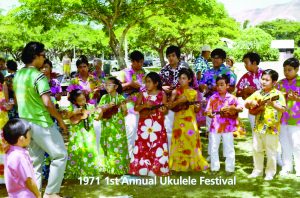
Roy and Kathy’s first annual ‘ukulele festival opened in Kapiolani Park in 1971. Since then, the ‘ukulele has been brought back into the mainstream of entertainment and the festival has reached popularity worldwide.
“I didn’t finish high school, but at age 20, I was lucky to get a job as a groundskeeper at Kapiolani Park,” said Roy. “I was so grateful for that job and did all they told me — and more. Working hard was never a problem. I liked working alone; hand-raking the whole park was my favorite job. Of course, I had learned social behavior — smiling, joking and nice teasing, but inside I was insecure and hurting. I never talked down to others because I didn’t want them to speak badly about me; instead, I bit my lip to protect myself. I never spoke of feelings or love. I did not know what the word ‘love’ meant. Even as I was still struggling with a crushed spirit. I picked up my ‘ukulele and a tune spilled out:
I am what I am;
I’ll be what I be
Look, can’t you see
that it’s me, All of me
Copyright: Roy Sakuma Productions, 1970
“This song would become a theme for my life,” said Roy. “Once we doubt who we are and forget that we are special, bad things can happen.
Love is Patient and Kind
“In my early 20s, I met Kathy, the first girl I ever wanted to date,” said Roy. “I got up my nerve to ask her out to see the Harlem Globetrotters, who were coming to town. Thank goodness for the Globetrotters!
“From then on, Kathy and I dated once every couple of weeks, and I wanted to hold her hand, but I was afraid for her to touch me,” Roy admitted. “Hugging and other expressions of love were foreign to me and scared me. One time, we attended the Punahou Carnival, and to avoid getting separated in the crowd, I had to grab her hand. Holding hands wasn’t so scary after all.
“A year later, I told her that I loved her and asked her to marry me,” Roy said. “She said, ‘yes!’ I went home so happy. But the next morning, I woke up crying — I knew that I must let her go. I didn’t deserve her and she would be better off without me. This love thing was beyond me.
“The next day, I asked her to meet me,” said Roy. “I asked her to please listen. I told her the truth about my fears — that my ear makes me hate looking in the mirror when I comb my hair, that I am paranoid and hate to see my body , that I am so ugly I don’t belong here; I am so ashamed that I could never make her happy.
“My philosophy is to
put love on top of everything.”
“Kathy listened. I did not want her to pity me; I wanted her to walk away and find a better man. Finally, she said, ‘I don’t see these things as your weaknesses. I see them as your strengths.’
“I was stunned. I just told her all my imperfections and failings — and she still loves me! Her love released me from the prison of my pain. It was like a gust of wind that cools the face. I had shared everything with her, and I could never go back there by myself. She loved me! Her love allowed me to reveal everything and to heal.”
Soon they married and became a team.
Love Rejoices in Truth
Since 2007, Roy Sakuma has been sharing his story with elementary and high school students — not as a music teacher — but as an inspirational speaker. His deep, intimate message touches youths who might be hurting like he was — troubled, isolated from their families, or struggling with thoughts of suicide. Roy doesn’t offer them advice; he doesn’t criticize their ideas or behavior. His story strikes a familiar chord.
“When I share my story, I ask kids who are hurting to raise their hands,” said Roy. “Hands go up and it is their way of reaching out.”
They recognize that he endured deep hurt and can understand their pain. They listen because he does not pity them. Instead he offers them the same key that unlocked his chains — love. And he points them to the richest source of love, their parents and teachers.
Listen With Love
Roy’s message of love over hurt is not only for youth but also for adults.
“Once kids fill up with hurts and shut down, responsible adults that they respect can help,” said Roy. “Adults can listen to them with love — with an open heart and mind.
“Kids really want to talk to their parents, but they are so afraid,” Roy continued. “They think that their parents are not interested, won’t listen or don’t understand them. Kids believe their parents: ‘won’t understand me, don’t love me, ignore me, don’t care, always get mad at me…’
“Parents often compliment and criticize their kids in the same breath. ‘Kimo, you did a great job, but…’ A hurting kid who can’t process their feelings will reject your encouragement as soon as they hear ‘but.’ They are bursting with so much hurt that they have difficulty seeing beyond it. Try giving compliments and then just listening.”
Love Endures All Things
“If you found a good way to deal with your feelings, share that with your kids,” said Roy. “Help them process their feelings with family and other trusted adults. Most of all, recognize that your child’s feelings are real and honest.
“Love your teens with the same unconditional love and forgiveness you gave them when they were 1-year-old toddlers. Parental love is forever. Put love on everything before you say it.
“In our music studios, we teach with love,” said Roy. “‘Ukulele music takes away stress and music crosses all emotional barriers. For some, the lesson is the highlight of their week. For us, it is an opportunity to share love, laughter and hope.”
ROY SAKUMA ‘UKULELE STUDIO
3555 Harding Ave., Honolulu HI 96816
808-732-3739 | www.roysakuma.net

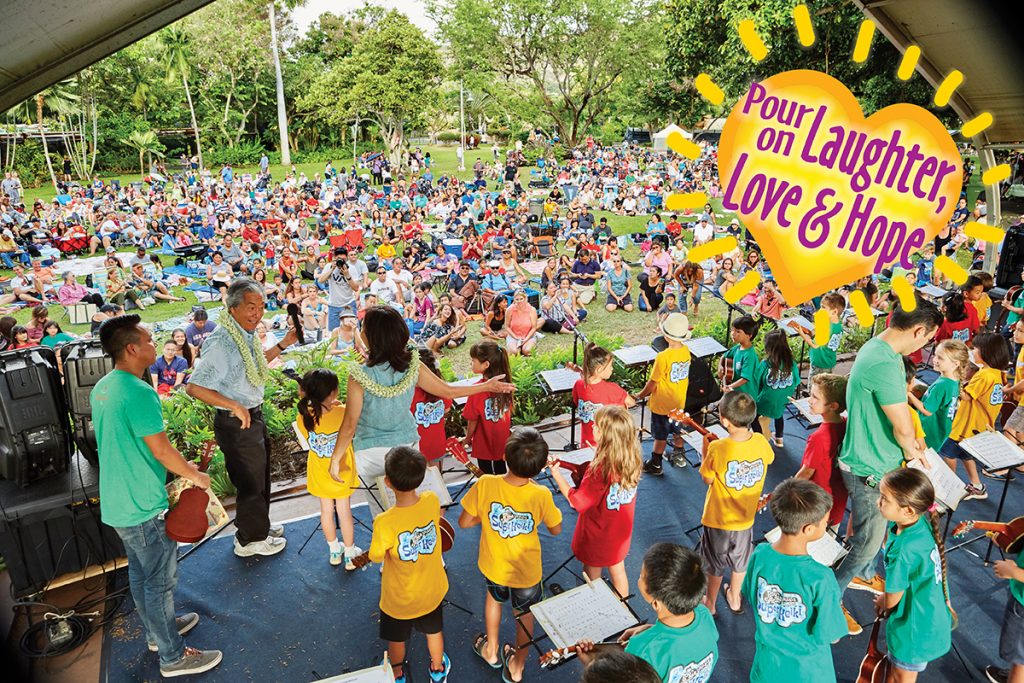






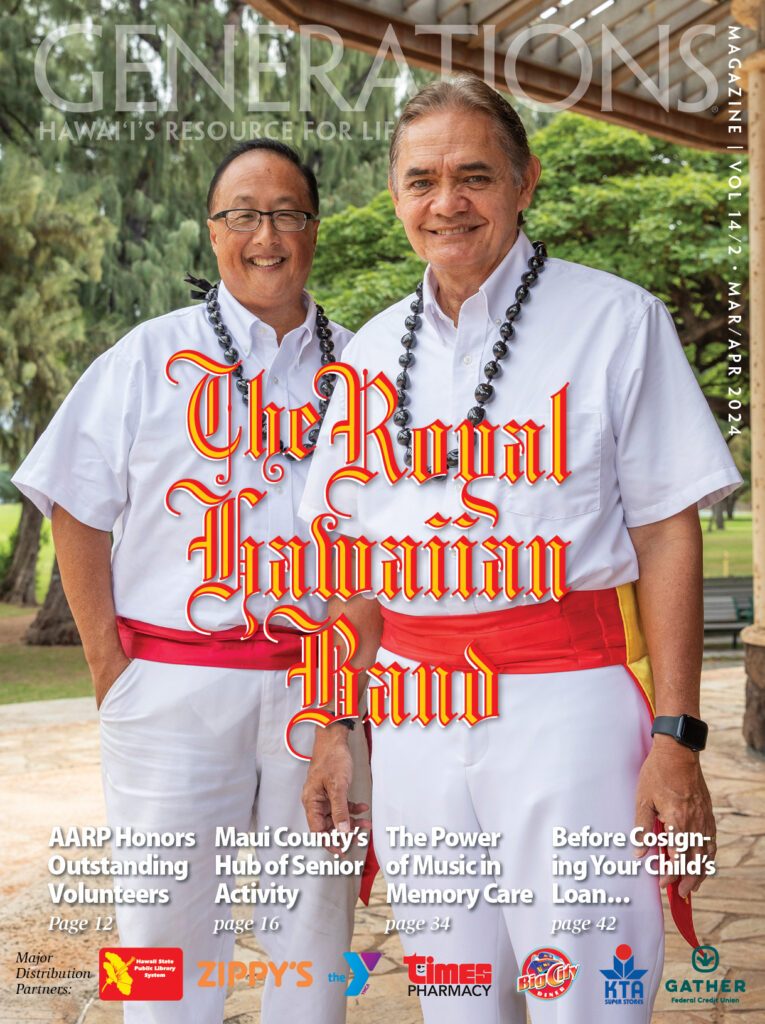
I am thankful to GENERATIONS for publishing this magazine and to Katherine Kama‘ema‘e Smith for writing Roy Sakuma’s story. I was one of the members of the Pearl City Hongwanji Mission, who attended a Project Dana service on February 11, 2018. We were very privileged to have Roy Sakuma as the guest speaker. His story captured everyone from beginning to end. I was so moved as I listened to what he had to endure as a child, adolescent, teenager and young adult until he met his wife Kathy. When my tears started to well, it suddenly was like a dam that broke loose. I could feel my body shaking from my muffled sobs. Roy shared with the congregation part of what Katherine Smith wrote about him. I wondered how anyone could survive all that hurt and pain. I was so touched and cried even harder when he shared about his wife Kathy who took away all the pain he had bottled up inside of him. One can’t help but love Kathy as much as we got to love Roy in that short period. There was a lot more he shared about his life’s journey to the present. It would be wonderful if GENERATIONS could have a sequel written and talk about the compassion, love, and music he and Kathy have openly shared which has helped thousands of people in Japan, victims who lost everything from the Fukushima Disaster.